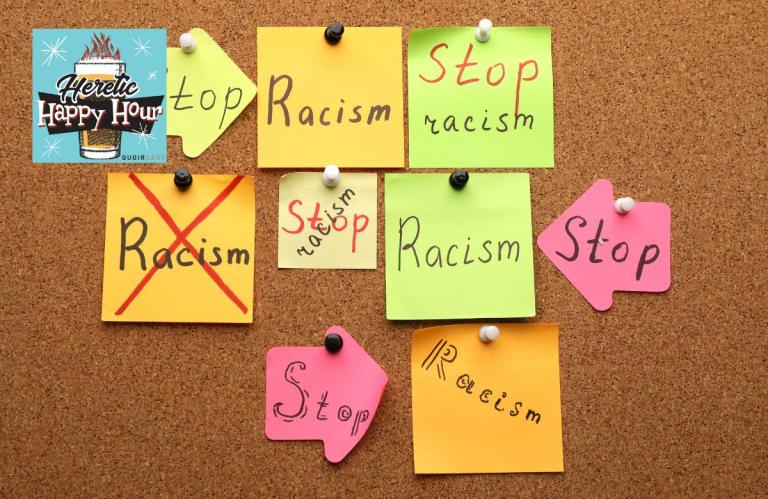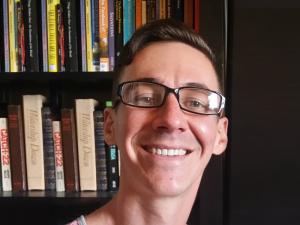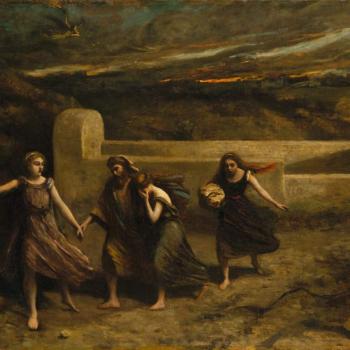
In a world where conversations about race often become muddled by defensiveness and denial, the latest episode of Heretic Happy Hour delivers a much-needed jolt of clarity. The show brought together a panel of powerful voices, including former host Desimber Rose, Daniel Henderson, author of The Spiritual Journey to AntiRacism, and the ever-inspiring Lisa Sharon Harper, to explore the often-misunderstood terrain of anti-racism. What does it mean to actively dismantle racism, and why is the common refrain of “I’m not racist” missing the point entirely?
The conversation wastes no time in pointing out the insufficiency of neutrality. Henderson captures this perfectly when he explains that being “not racist” is akin to standing still on a moving sidewalk that pushes forward white supremacy. In other words, passivity allows the system to perpetuate itself. To be anti-racist, as Lisa Sharon Harper adds, is to actively resist and disrupt the systems of privilege built into the fabric of society. Her analogy of a coffee shop where white customers are always served the best pour-over coffee while Black customers are given Folgers illustrates this perfectly. It’s not enough to be friendly with people of color—if you’re not challenging the system that favors you, you are complicit in its continuation.
One of the most powerful themes in the episode is the idea of white supremacy as a script that has been handed down through generations. Henderson reflects on his own awakening, realizing how deeply this script shaped his perspective as a white person in America. This script, he points out, convinces white people to deny the existence of systemic racism, keeping them in a state of plausible deniability. It’s not just about individual prejudices, but the larger systems that go unnoticed by those who benefit from them. The conversation becomes personal as Henderson discusses his family’s history, including the painful discovery that his great-grandfather was a member of the Ku Klux Klan. Confronting this legacy, Henderson emphasizes, is essential for anyone serious about anti-racism. White people must look inward, explore their ancestral histories, and reckon with the privileges and injustices handed down to them.
Lisa Sharon Harper’s insights take this idea even further. She challenges listeners to recognize that the systems of oppression we live under were born from a deeper cultural imagination that prioritized European supremacy. This mindset is not merely political or social—it is spiritual. She argues how racism is a profound theological problem, rooted in a failure to see the divine image in others. To dismantle racism, then, is to dismantle the idolatry of whiteness itself—a false god that seeks to elevate one group over another.
In one of the most moving moments of the discussion, Harper calls on people of European descent to engage in deep self-exploration, to trace their family histories, and confront the ways their ancestors may have been complicit in systems of oppression. Understanding our place in history, she suggests, is not about assigning guilt but about humanizing ourselves and others by acknowledging the ways we have all been shaped by these larger forces.
In the end, the episode of Heretic Happy Hour serves as both a challenge and a call to action. It’s not enough to sit on the sidelines or claim moral innocence. Anti-racism is a verb, an ongoing, active process that demands not only awareness but disruption of the racist systems still at work today. And as Harper, Henderson, Rose, and the rest of us on the podcast so passionately articulate, this is hard work—but it is the most essential work we can do if we truly believe in the radical equality of all people.
This episode stands as a compelling reminder: anti-racism isn’t a badge one wears but a lifelong journey that requires constant vigilance, humility, and action. It’s not enough to “not be racist.” The work begins when we commit to disrupting and dismantling the system itself.
Also, if you’ve been digging my work on here, and want to see me be able to continue writing as close to full-time as humanly possible, please take a look at my Patreon page at www.patreon.com/mjdistefano. Even $1 a month helps bigly!














